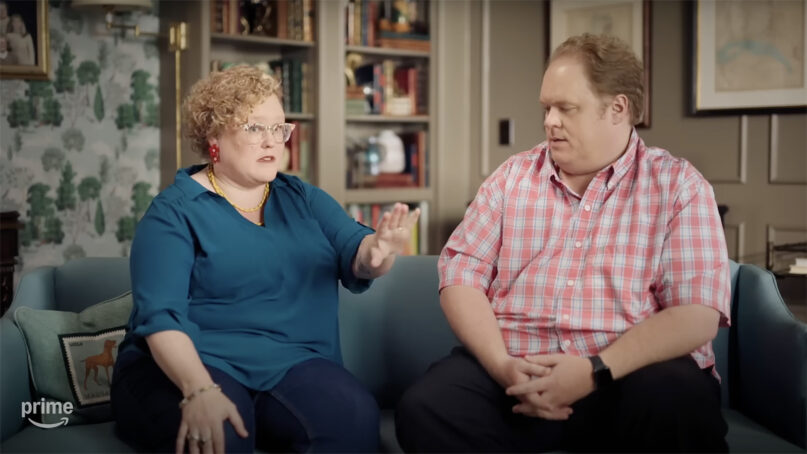(RNS) — In 1999, a man in his 30s, dressed in a red button-down shirt, stood in front of some 73,000 Christian teens and invited them into battle. “Do we have any fighting men and women in here ready for a fight for some souls?” Ron Luce, founder of Teen Mania, demanded of the crowd crammed into Michigan’s Pontiac Silverdome, to roars.
At that moment, Teen Mania was perhaps the most consequential Christian teen ministry in the world. Millions of earnest evangelical Christian youths had shown themselves ready over the previous 13 years to inscribe their hearts and not a few checks to change the world. Luce enticed them with a combative “us vs. them” approach to mainstream American culture. In the Silverdome, those militaristic undertones were made explicit, supercharging the youth movement for a new century.
What that century brought, in the now familiar story of many a supercharged ministry, were accusations of abuse from former members and outlandish fear tactics employed to mold the ministry’s teen interns, a gnarly underbelly that is the subject of the second season of Prime Video’s “Shiny Happy People: A Teenage Holy War.” The three-part docuseries, following the success of “Shiny Happy” season one’s 2023 examination of the prolifically pro-natalist Duggar family, rides the fascination with Christian subculture in exploring Teen Mania’s birth and seemingly inevitable demise.
What makes the Teen Mania story more than a rehash of evangelical overreach is watching how, as revealed at “Day One” at the Silverdome, Luce stoked the flames of the culture war still playing out on a national stage today.
When Luce and his wife, Katie, founded Teen Mania in 1986, it was envisioned as an international missionary movement. Global Expeditions, its first major initiative, would transport a group of teens and their leaders abroad for a few weeks, where they would win as many souls for Jesus as possible.
The group’s primary tactic involved Jesus skits, a youth group staple. Often accompanied by music, but no words, the teen missionaries typically acted out variations on the dangers of the temptations of youth — lust, greed, drugs, etc. — that most often end with a confrontation between Jesus and Satan, with Jesus emerging the victor.
But in the 1990s, the organization’s own events back home became emotive, high-energy spectacles in churches and arenas. Called Acquire the Fire, the events employed pyrotechnics, evocative music, intense lighting and stirring altar calls to convey the gospel message.

Carrie Saum in “Shiny Happy People: A Teenage Holy War.” (Courtesy of Prime Video)
“They weren’t appealing to our intellect. They weren’t appealing to our common sense. Looking back at it now, they weren’t even really appealing to our spirits,” Carrie Saum, a Teen Mania alumna featured in the docuseries, told Religion News Service. “They were appealing to our emotions. And that was a really powerful drug.”
April Ajoy, an influencer and author of “Star-Spangled Jesus: Leaving Christian Nationalism and Finding A True Faith,” remembers attending Acquire the Fire events as a kid. Luce’s rhetoric, which she describes as very “black and white,” had a lasting impact.
“You leave so fired up, and you have this deep sense of purpose that there’s no higher calling than for you to give up your entire life to spread the gospel, to save souls,” Ajoy said in an interview. “Because you literally believe that if people do not have your beliefs, that they do not believe in Jesus the way you do, that they will die and go to hell.”
Liz Boltz Ranfeld, the daughter of former Christian musician Ray Boltz who appears in “Shiny Happy People” with her brother Phil, said, “There was the pressure of, I have to get this right, because I have to get these people saved.” But she and her brother don’t discount the intense messaging as a motivator for their evangelism.

Siblings Liz Boltz Ranfeld and Phil Boltz in “Shiny Happy People: A Teenage Holy War.” (Courtesy of Prime Video)
Acquire the Fire events were also used to enlist interns enrolled in the Honor Academy, an intense, on-site gap-year program that included everything from janitorial work and groundskeeping to promoting Teen Mania events. Rather than being paid for these duties, the interns were charged hundreds of dollars a month for the experience, which included early wake-ups, mandatory physical training and adherence to strict rules. No dating or secular music was allowed. Violations, former interns recall, could result in immediate ejection from the program.
Some of the most troubling elements of the program, such as ESOAL — Emotionally Stretching Opportunity of a Lifetime — were designed to push teens to their limits. A boot camp-like experience involved sleep deprivation, mud crawls, wearing military-style fatigues and, some recall for the camera, rolling down vomit-strewn hills.
According to its alums who talked to “Shiny, Happy People,” the manipulation and unpaid labor directly contributed to Honor Academy’s booming success.
In 2005, Teen Mania doubled down, launching the Battle Cry Campaign. Backed by conservative Christian icons such as Chuck Colson, Pat Robertson and Joyce Meyer, it put Luce on a national tour where he deployed war metaphors to urge Christian kids to stand against pornography, gay marriage and materialism.
“It was always, we have a fight. There’s a fight for your young people’s souls, and we’re casting out the devil,” Saum said.
About that time Teen Mania joined the Arlington Group, a coalition of Christian right conservative groups that included the American Family Association, Center for Moral Clarity, Family Research Council and Focus on the Family. By 2014, it had been endorsed by evangelist Billy Graham, former President George W. Bush and Bishop T.D. Jakes, among other influential leaders.
But a year later, Teen Mania Ministries abruptly announced it would shut down. An RNS report from the time cites financial trouble, but also the stories of mistreatment and spiritual abuse being told by watchdog groups and on alumni blogs. As the criticism became public, the Honor Academy struggled to recruit interns. Soon, Teen Mania’s headquarters in Garden Valley, Texas, was in foreclosure.

April Ajoy in “Shiny Happy People: A Teenage Holy War.” (Courtesy of Prime Video)
But the end of Teen Mania didn’t mean the end of its influence, according to the documentary. “The army Ron trained is still out there,” Mica Ringo, creator of the “Recovering Alumni” blog for former Teen Mania interns, tells the filmmakers. Ajoy told RNS that she hears echoes of Teen Mania in the rhetoric of today’s Christian nationalists, who, she said, try to convince Americans, “If you can keep people from sinning through policy and laws, then they have a better chance of going to heaven.”
Ajoy said the importance of “Shiny Happy People: A Teenage Holy War” highlights how extreme, warlike, pro-Christian rhetoric has entered mainstream American discourse, particularly in the evangelical world.
“Most people who espouse Christian nationalism in some way don’t think that they are Christian nationalists,” Ajoy told RNS. “They think they’re just being good Christians. They love God. They love people. They vote Republican, because that’s part of it too. But they genuinely believe … that turning America Christian is a call from God.”



